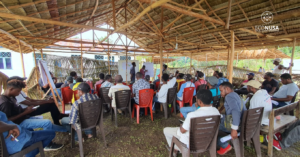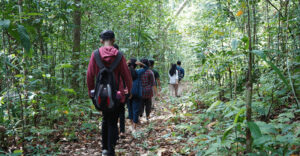
Covid-19 pandemic has impacted nearly all communities of all layers across Indonesia. The pandemic does only affect the health aspect but also a knockback to economy including that in Tanah Papua and Maluku Islands.
Most people in Raja Ampat, West Papua, rely on their livelihood on ecotourism sector. But, pandemic has crumpled the community economy due to the absence of tourists visits. Communities in North Maluku that count on their lives on local farming crops suffer from the impact. Marketing of local products declines drastically due to the restriction of transportation and low purchasing power of the urban community. The condition impacts income of the locals to meet their needs.
Such strike has urged villagers in Tanah Papua and Maluku Islands to go back to farming to meet their daily needs. The stranded gardens are now planted with various plants for food.
Responding to the impact of pandemic to economy and food security of the local villagers, EcoNusa Foundation held a mentoring program for organic farming while distributing farming equipment as part of the EcoNusa Covid-19 Response series collaboration with Perjampat (Raja Ampat Local Business and Livelihood Association). The given supports are expectedly to boost up food security system of the community during the pandemic.
Read also: EcoNusa COVID-19 Response Responding Pandemic Impact at Raja Ampat

In Raja Ampat, most communities in Arefi Timur live from farming and tourism. But, during the pandemic, they are eager for farming. According to Frans Dimara, the vice chair of Village Assembly Body, Arefi people have actually lived from farming for years in addition to ecotourism providers. But, they lack a structured method for seeding and harvesting.
Sony Rumbino, one of the participants of organic farming mentoring in Saporkren, has been keen on gardening since last May. He who used to be a tour guide for birdwatching has drastic drop in his livelihood. To survive his wife and four children, he starts farming nearby his residence. In the 50 x 60 meters area, he plants cassava, potatoes, betel and corn as the seeds are easily found in the forests.
“Since February, there have been no guests paying a visit to Saporkren to watch birds. Since 2004, we have worked as a tour guide for international and domestic tourists for birdwatching in Saporkren. This kind of situation has never happened,” said Sony.
It similarly happens to the community in Sawinggrai which has so far been the tourism destination of European tourists. One of Sawinggrai peoples, Tabita Rumbewas, dubbed Mama Tabita, has cultivated her 100 x 80 meters garden that was stranded before. She plants cassava, potato and corn as vegetables do not grow well. But, Mama Tabita feels grateful as her stranded garden could produce food after a long time left due to her focus on homestay management.
The last three villages EcoNusa team visited, Kaliam, Solol and Amdui, are deemed the central producer of betel nut, coconut, banana and fruits. Meanwhile, vegetables are not well cultivated here. Villagers commonly disseminate seeds without any proper cultivation. They just rely on soil fertility.
With the counseling on organic farming, EcoNusa expects that people in Raja Ampat are assisted to get much knowledge on gardening. According to the farming mentor team, Utreks Hembing and Jemima Desi Wamna, people used to know about temporary farming with just planting and leaving. But now, they have more understanding on alternative farming. They learn bit by bit the farming procedures such as fertilizing and pest eradication.
In addition to some activities in Raja Ampat, in North Maluku EcoNusa Covid-19 Response made a collaborative work with PakaTiva Association. Organic farming counseling to the community was conducted in cooperation with the local Agriculture Office.
Risky Bello, PakaTiva Association’s Covid-19 Recovery, spoke to EcoNusa that most of the assisted communities are farmers. Their crops every year are mainly nutmeg. Some produce coconut oil. But they also cultivate monthly crop such as pepper, tomato, mustard greens and other sort of vegetables.
“Organic farming counseling provided to the local community focuses mainly on seeding. It intends to get their own seeds instead of relying on seeds from industry,” said Risky. He also explained that the counseling was also intended to boost a stronger food resilience during the pandemic when they got marketing problems with their crops.
Pandemic has apparently taught us that food as the basic human need actually depends on the nature. The commemoration of World Food Day on 16 October would serve as a way to reflect that agriculture is important to survive life, particularly during such a hard time. Local farming is expectedly not to stop despite the end of the pandemic. But, it should go on to create a community’s food resilience and security.
Interview: Muhammad Syukron Makmun, Novi Sartyawan & V.A Wulandani
Editor: Leo Wahyudi







